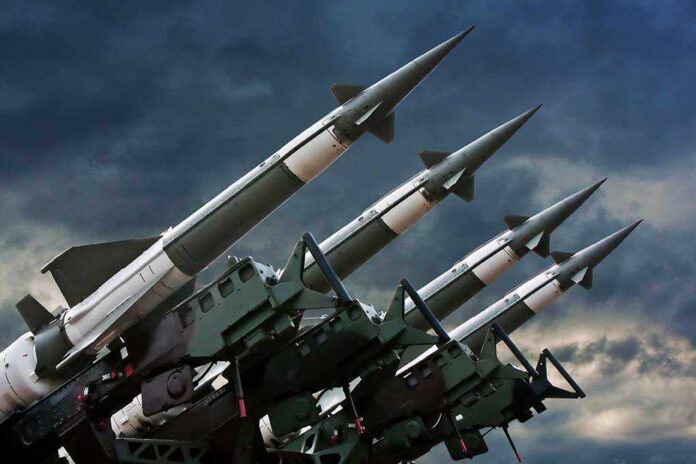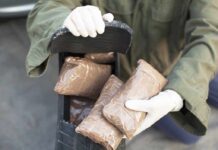Russia accuses Serbia of “shooting in the back” by supplying arms to Ukraine, potentially fracturing a long-standing alliance as Kremlin intelligence agencies reveal weapons are reaching Kyiv through fake end-user certificates and intermediary countries.
Key Takeaways
- Russia’s Foreign Intelligence Service (SVR) claims Serbian defense companies are providing significant ammunition supplies to Ukraine despite Belgrade’s declared neutrality.
- Serbian President Aleksandar Vucic has discussed the arms issue with Russian President Vladimir Putin, agreeing to form a joint working group to investigate how Serbian weapons reach Ukraine.
- The accusations involve alleged fake end-user certificates and third-country intermediaries to disguise the final destination of weapons exports.
- Serbian opposition groups have criticized Vucic for potentially damaging relations with Russia, a traditional ally and key energy supplier.
- Despite seeking EU membership, Serbia has not joined Western sanctions against Russia while still maintaining arms exports that could benefit Ukraine.
Moscow’s Accusations of Betrayal
In a stunning diplomatic confrontation, Russia has publicly accused longtime ally Serbia of “backstabbing” by supplying arms to Ukraine. The Russian Foreign Intelligence Service (SVR) issued a scathing statement claiming Serbian defense enterprises are violating the country’s official neutrality position by shipping substantial quantities of ammunition to Kyiv. This unexpected public rebuke signals a potential deterioration in relations between two nations that have historically maintained close cultural, religious, and political ties.
According to Russian intelligence sources, Serbian weapons manufacturers have been using deceptive practices to conceal the ultimate destination of their products. “The cover for anti-Russian actions is a simple scheme using fake end-user certificates and intermediary countries,” stated the Moscow-based spy agency. This alleged scheme reportedly involves routing weapons through third countries like the Czech Republic, Poland, Bulgaria, and various African nations before they reach Ukrainian forces.
Scale and Impact of Alleged Arms Transfers
The Russian accusations go beyond merely identifying the practice – they specifically quantify the alleged scale of Serbia’s contributions to Ukraine’s war effort. According to the SVR statement, Serbian defense industry workers have provided “hundreds of thousands of shells… as well as a million rounds of ammunition for small arms” to Ukrainian forces. The statement directly links these supplies to Russian casualties, emphasizing the personal betrayal felt by Moscow.
“The contribution of Serbian defense industry workers to the war unleashed by the West, the outcome of which Europe would like to see as a ‘strategic defeat’ of Russia, amounts to hundreds of thousands of shells … as well as a million rounds of ammunition for small arms,” stated the SVR statement
In particularly harsh language, the Russian intelligence service accused Serbia of putting profit before their shared Slavic heritage and traditional alliance. “Serbia’s military industry is trying to shoot Russia in the back,” the agency claimed, framing the arms sales as a direct betrayal of their historical relationship. The timing of these accusations is notable, as reports of Serbian arms reaching Ukraine have circulated since 2023, raising questions about why Moscow chose this moment to publicly confront Belgrade.
Serbia’s Diplomatic Balancing Act
Serbian President Aleksandar Vucic finds himself in an increasingly precarious position, attempting to balance pro-Western economic interests with traditional ties to Russia. After the Russian accusations surfaced, Vucic reportedly discussed the arms export issue directly with President Putin, agreeing to establish a working group to investigate how Serbian weapons are reaching Ukraine. This indicates Serbia’s desire to address Russian concerns while maintaining plausible deniability about direct involvement.
“It is unlikely that such supplies can be justified by ‘humanitarian considerations.’ They have one obvious purpose — to kill and maim Russian military personnel and the civilian population of Russia,” stated the SVR statement
Serbia’s delicate position is further complicated by its dependence on Russian energy supplies and ongoing negotiations for a gas import deal with Gazprom. While officially condemning Russia’s invasion of Ukraine, Serbia has notably refused to join Western sanctions against Moscow, a stance that has stalled its EU membership bid. Vucic’s attendance at Russia’s Victory Day parade in Moscow, despite criticism from EU officials, highlights the tightrope he continues to walk between East and West.
Domestic Political Fallout
The Russian accusations have created significant domestic political turbulence within Serbia. Opposition leaders have seized on the issue to criticize Vucic’s government for potentially damaging the nation’s relationship with its most important international ally. The leader of the nationalist Dveri party, Ivan Kostic, has been particularly vocal in condemning what he sees as a betrayal of Serbia’s national interests and traditional alignment with Russia.
“It’s clear now that Aleksandar Vucic’s regime openly works against the interests of Serbia and its citizens by openly taking one side, thus undermining Serbia’s political position,” said Ivan Kostic.
This controversy reveals the deep divisions within Serbian society regarding the country’s geopolitical orientation. While some Serbians favor closer integration with the European Union and Western institutions, others maintain strong emotional and cultural ties to Russia, viewing it as Serbia’s traditional protector. The arms sales controversy has inflamed these tensions, forcing ordinary citizens to confront difficult questions about national identity and allegiance during a time of heightened international conflict.











